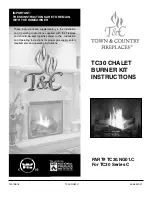
Heat & Glo • EM-42 • 28324 Rev U • 02/07
13
Risk of Smoke Spillage
Outside air inlet must be located to prevent blockage
from:
•
Leaves
•
Snow/ice
•
Other
debris
Blockage may cause combustion air starvation.
CAUTION
Sharp Edges
• Wear protective gloves and safety glasses
during installation.
CAUTION
4
4
Installation of Fireplace
Fire Risk
Asphyxiation Risk
Do not draw outside combustion air from:
• Wall,
À
oor or ceiling cavity.
• Enclosed space such as an attic or
garage.
• Close proximity to exhaust vents or
chimneys.
Fumes or odor may result.
WARNING
Outside Air
Kit Assy.
Outside Air
Shield
2 Wire Ties
Flexible Duct
(not supplied)
Figure 4.1
Outside Air Installation
A. Install the Outside Air Kit
This
¿
replace will operate correctly only if adequate ventila-
tion is provided to allow proper draft to the
¿
replace system.
See Section 2.
The outside air kit is supplied with this
¿
replace. Using an
outside air kit is highly recommended to minimize the effects
of negative pressure within the structure. We recommend
you utilize the shortest duct run to optimize the performance
of the outside air kit. Cold air
À
ow can be minimized by put-
ting a small dip in the duct creating a cold air trap. This trap
can also help prevent heat build-up and exhausting out the
intake due to the stack effect. The outside air kit inlet should
be positioned in a manner that will not allow snow, leaves,
etc. to block the inlet. In some installations the air duct
may need to be run vertically. In such an installation, a 3 ft
(.914 m) height difference must be maintained from the top
of the uppermost chimney section to the outside combustion
air inlet. See Figure 4.2.
The outside air kit is installed on the right hand side of the
¿
replace. Remove the insulation in the tube, slide tube out to
fasten duct to it. See Figure 4.1.
See Figure 4.3 for proper placement of outside air inlet.
See Figure 4.4 for handle location/operation.














































